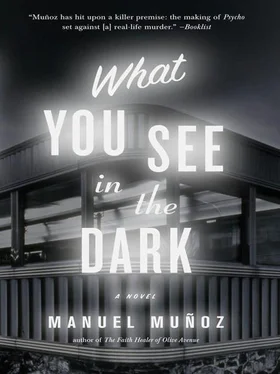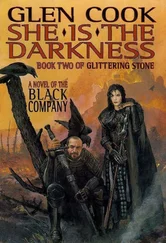“Driver, we should probably get along and not bother this woman,” said the Director.
“That’s awfully rude,” said the Actress when Carter turned on the engine. “We can politely tell her we’re leaving. She’s making her way down here.”
“You have a good eye,” said the Director, “but I can see you’ve never had to deal with people.”
“Cut the engine, Carter,” said the Actress, rolling down the window. She stopped midway when she got a look at the woman coming toward her. Was it the color of the woman’s waitress uniform? Or was it the way the woman looked back at her, a slight hesitation in her step at the recognition, even though the window was rolled down only halfway. She could not, the Actress knew, stay half-hidden, and so she continued turning the handle until the woman could see clearly into the car.
There was a point when the woman knew exactly who the Actress was, and she stopped almost midstride, close enough to the car to speak without having to raise her voice.
“You …,” the woman said.
The Director leaned in to the Actress to whisper as low as he could. “You know this woman?”
“Good evening,” the Actress said, but her words came out with a nervousness she did not intend, and she could see the woman bend down a little to see who else was in the car. She seemed a bit taken aback when she saw the Director in the backseat.
“You’re movie people …,” the woman said.
“Yes,” said the Actress. “You see, we’re in Bakersfield scouting sites for a new film …”
“I asked you in the café if you …,” said the woman, shaking her head. “You lied to me.”
“I apologize for that. I really do,” said the Actress. “It’s something I must do, just to be in public.”
The woman folded her arms. Though she stood a bit away from the car, there was no mistaking that she was small framed, her thin brown hair pulled tight in a bun, her eyes souring at them in distrust, her mouth pursing downward. “Do you know you had all those young girls riled up? I’ll look like an old schoolmarm for telling them to hush up about you.”
“I really do apologize. I hope you understand.”
“What is it you’re doing out here?” the woman asked. “On my property.”
“Well, we’re scouting sites for a motel — for the film — and this looks like a superior location, compared to the others we’ve seen in the area.”
The woman leaned a bit to take a look at the Director, but the Actress could feel him settling back in his seat, as if he didn’t want to speak at all. The woman glanced at the driver, her uncertainty and suspicion only deepening.
“Let her know we compensate,” the Director whispered.
“We’d pay you a bit,” said the Actress. “Just to look at the rooms and the layout. Take a few pictures. We can send someone out tomorrow.”
The woman made as if to go back to the house, dropping her arms from her body, shaking her head. She turned back to them. “I don’t think so.”
“May I ask why?” the Actress called out after her.
“To be honest,” said the woman, “I don’t like dealing with liars.”
“Tell her we’ll compensate handsomely,” the Director said.
“I do think we could manage a nice compensation,” said the Actress. “For all your time.”
“You Los Angeles people …” The woman shook her head. “You think money solves everything. You’re so goddamn money-grubbing. You could’ve just rented a room and scouted all you want when I wasn’t looking.”
“Just let her go,” said the Director.
“Thank you for your time,” the Actress said, and started to roll up the window.
The woman took a few steps back toward the car. “You know, if you hadn’t lied about who you were …” Her voice rose as in a pitch of anger, firm yet cracked through with a pain so apparent that the Actress wanted to hold the sound in her fingers, a small, angry pulse in her hands.
“We’re very sorry to have bothered you, ma’am,” said the Actress, rolling up the window with a rush, muffling the woman’s words, and she urged Carter to get them going.
The woman reached the car and rapped at the window with a flat palm, but they couldn’t hear what she was saying, and Carter pulled away with enough of a rush to kick up some of the gravel, the Actress staring straight ahead in a bit of embarrassment, yet at the same time filled with a need to turn back to see how the woman had been left standing.
“Awfully defensive,” said the Director. “Whatever was she talking about?”
“In the café,” said the Actress. “She was our waitress, the hostess. Did you see her, Carter?”
“I did, ma’am.”
“What was she angry about?” asked the Director.
“She recognized me and I told her she was mistaken,” said the Actress, and yet while she saw that such an exchange shouldn’t have warranted such a reaction, something else about the woman lingered with her, a strange understanding.
“So unpleasant,” said the Director. “In any case, I’m sure the set decorator can put together a typical room from a few photographs. It’s an easy layout to copy. Flat, rectangular. Nothing complex.”
No, the Actress thought, not complex at all. Carter drove them back into Bakersfield. She put her hand to her forehead and leaned against the door, sighing audibly as if she were tired, and the Director took the hint. The ride back was quiet. She thought about the woman, her fierce response to their presence, to her small white lie. What kind of person was she to react with such defensive hurt? she wondered. The woman was a café hostess, but what was she doing at the motel? Was it a second job? No, not if she was still wearing the uniform. Perhaps she was the wife of the man who owned Watson’s Inn, an unhappy marriage, given the way the Actress had noticed the woman casting glances at her and Carter during their meal. The woman had tried to figure out if she could place her as a Hollywood star, to be sure, but she had also paid mind to the way she set down the plates in front of Carter, her eyes darting quickly to his face as if to gauge if he was pleased. A café waitress. A wife. A motel owner. A harried café waitress. A lonely wife. A desperate motel owner. She spun the words in her head, more and more of them, inventing, watching Bakersfield come into view. Who could live in this city? What brought or kept them here?
The Actress thought of what she’d discussed with the Director that evening, about exteriors and brevity and visual cues, and she brought all this to bear on her character, the Phoenix secretary. A Phoenix secretary was not enough. For simplicity’s sake, yes. But a Phoenix secretary had an interior, too, a heart filled with dark hope and longing after she’d looked at a photograph and with justifications she’d made while lying awake in the dark. The Actress would not gloss over these things, however much she had to invent them, have hints of it flash across her face. It’s all in the eyes, the aging silent actress had told her many years ago, and she was discovering that this was truer than she ever thought possible, that the aging actress had been talking about more than just beauty all along.
The months went on and things did not change. October rolled on through November, the December gray finally blocking out the sun. As the year wore on, Arlene took notice some days of how the morning looked through the plate-glass windows. How did Bakersfield ever get through the summer heat, the intolerably white sunlight? The only thing changing was the season, but who paid attention to that? Not the girls chattering along and unfocused while the customers waited for coffee. Not Dan, still seeing the young Mexican girl from the shoe store, sometimes even daring to come into the café with her, her little shoulders sporting a new winter jacket. What could Arlene do? Did she want things to change? The farmers noted the change, though you couldn’t tell from Vernon, who still came in during the late morning, or Cal, who joined him at the counter not fifteen minutes later. They bantered with her, and the exchanges were mechanical yet soothing to Arlene, like listening to a clock. No, not much was changing except the weather, the seasons, Arlene ending her café shifts at five with the streets nearly gone dark. Her Ford was a serviceable’52, but the engine doubted itself more and more as the chill of evening settled deep all around her. She made the nervous drive home with a certainty that her headlights would fail, but they, too, held on. It was a change she wouldn’t have wanted — the need for a new car when winter was making money scarce all around the city.
Читать дальше












